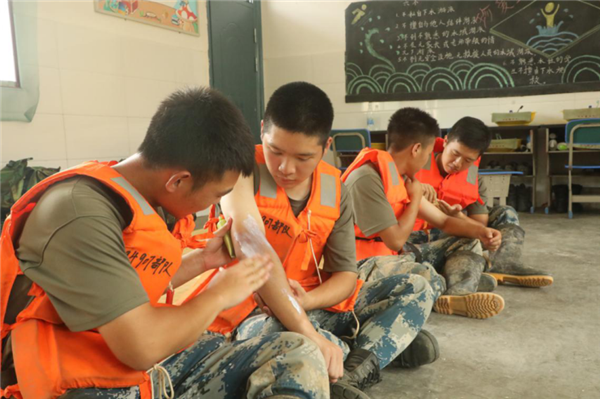
By Zhang Mimi, Fu Gan and Lin Wengui
Troops of a ground-based missile brigade of the air force under the PLA Eastern Theater Command have been fighting the flood in south China for nearly half a month. Up to now, no service members got ill and the non-combat attrition rate is zero, in spite of the troops' long time flood-fighting efforts in high temperature and high humidity.
"I was so deeply moved by the thoughtful preparations made by our logistic support troops," said Private Tu Chao. It was the first time for him to participate in an anti-flood mission. He was distributed with rain boots, moisture-proof mattresses and other items before setting-off. And on the first day of the mission, when he returned from the embankment at 9 p.m., he saw the heat stroke prevention drugs, sunscreen cream, and sun-protective sleeves on the bed at the first sight.
Zhu Zhengyou, head of the logistic support department of the brigade, introduced that they had make thorough plan and preparation based on their experience of previous anti-flood missions, and fully predicted the difficulties that might be encountered by officers and soldiers this time. Based on this, they came out with this sunburn-protection package before the departure.
Besides, the brigade prepared extra camouflage uniforms, shoes and T-shirts to each service member, to ensure that they could put on dry clothes when returning from the flooding site.
Inside the temporary warehouse, there are piles of mineral water, canned porridge, milk, bread and other food. "The warehouse is open 24 hours a day, and these foods are available at any time," said Yang Tao, head of the supply section of the logistic support department. To facilitate service members to grab water or food at intervals of short break, they also got food and drinking water stored in those shuttle vehicles.
In addition to such materials support, the military doctors of the brigade also made great contributions to the zero non-combat attrition rate. Dr. Zheng Rongrong would tirelessly remind the officers and soldiers to apply medicine every time they were to perform tasks in water. "It takes two to three days for symptoms to appear after being infected with schistosomiasis cercariae, so protection is very important," Zheng said.
Before bedtime every day, Dr. Zheng Rongrong and the hygienist would tour the camp, check the physical condition of each soldier and replenish medicines timely. During the daytime, he would continue to urge the soldiers to take oral rehydration salt powder in time to prevent the occurrence of hyponatremia, hypochloremia, and heatstroke caused by excessive sweating.
On a notebook that Zheng carries with him, there is a highlighted name list, "These are the officers and soldiers who have eczema. Special attention should be paid to their diet..." he said.
Everyone is doing his duty and contributing to the flood fight. Since performing the anti-flood mission, all members of the brigade have been in good health, and no one falls ill. "Maintaining health means maintaining combat capability," said Zhu Zhengyou, head of the logistic support department of the brigade.









